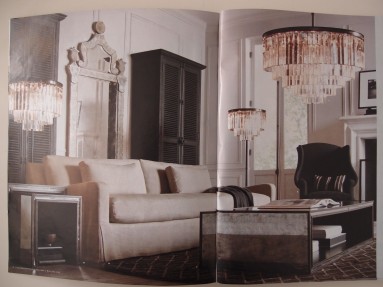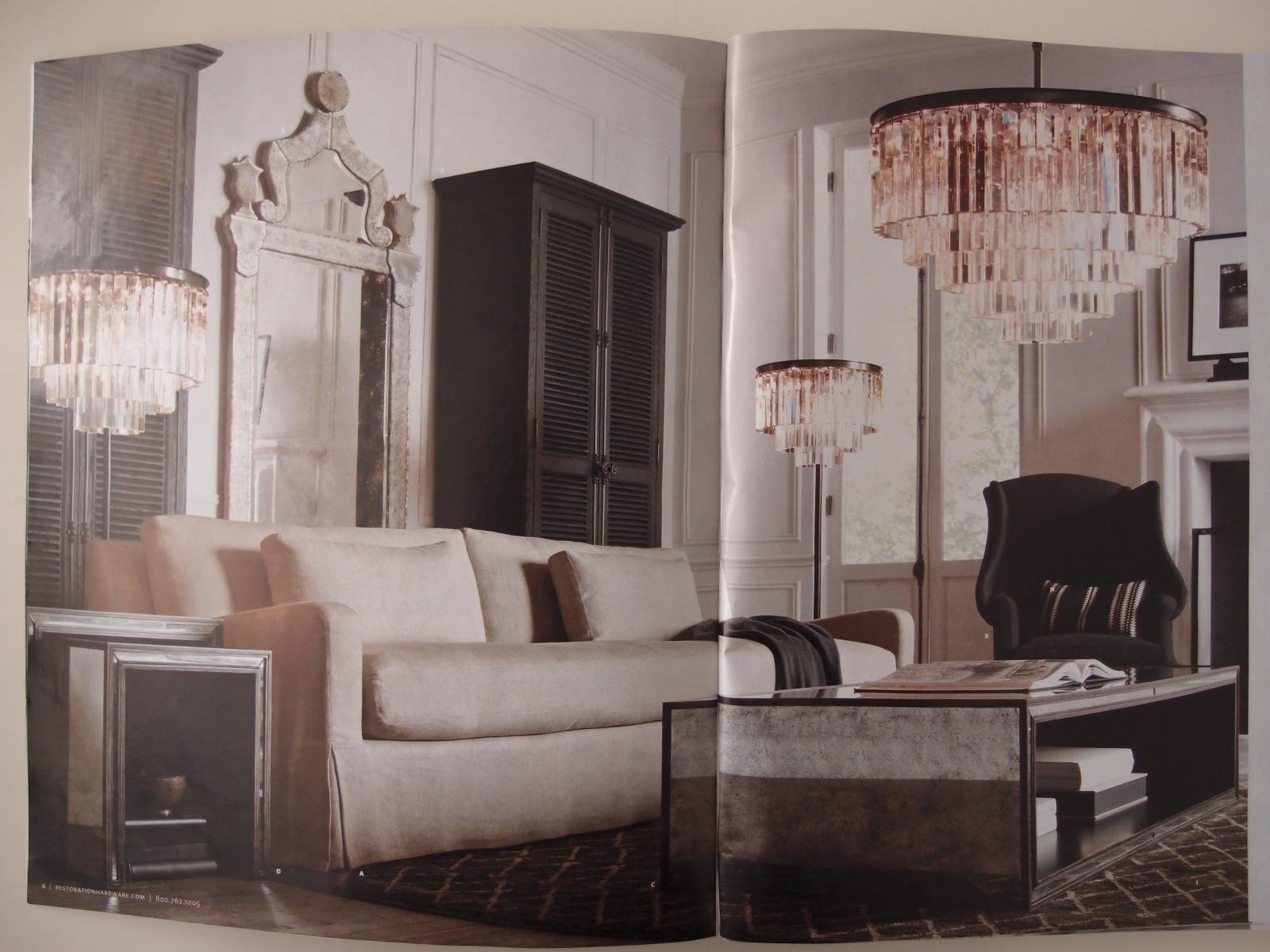[prior chapter here]
CHAPTER 2.
INTRODUCING
THE
STRAND
ANTIQUED
MIRROR
COLLECTION
RECALLING THE STREAMLINED SIMPLICITY OF FRENCH ART DECO FURNISHINGS, STRAND STRIKES A HARMONIOUS BALANCE BETWEEN UNDERSTATED GLAMOUR AND FUNCTIONAL DESIGN. CONSTRUCTED WITH WATERFALL EDGES, THE MIRRORED SURFACES ARE AGED FOR AN ANTIQUED PATINA THAT’S COMPLEMENTED WITH DARK METAL TRIM.
C-D. Strand Mirrored Table
48” Nesting Side Table $995
48” Coffee Table $1095
72” Coffee Table $1295 (Shown)

The relief we felt at having left behind the oppressive presence of the Montpellier armoire, coupled with a tinge of self-recriminating melancholy for having so misjudged its malign nature, was far from minor. We were, I’ll admit, almost giddy. S. crept to the door - which also lacked a handle, although for our own sake we avoided thinking about its obvious similarity with the last unhandled door seen - with highly exaggerated tip-toeing, her calf muscles stretched taut from within the loose cuff of her blackened boot toward the equine knee. There she took hold of it and, supplying the creaking sound that it did not in fact make, craned her neck around with glacial slowness, as though to peer with wide owlish eyes into a room where excessive danger or knives lay. The whole effect was quite funny, and C. simply couldn’t stop giggling, her small, loose teeth joyously chattering, even after having been informed by S., in a comically cheery voice, No worries, everybody, no armoires in here! In truth, we all had a good laugh as we entered.
Whereupon the laughter died in our throats, with a sound similar to that of sparrows drowning in a shallow pond.
The mirror. That awful mirror. There was no mistaking it. The door behind us couldn’t be opened from this side - come to think of it, had we even opened it from the other, or had it just opened to us, waiting for a hand to come near so as to coddle the illusion of agency and the exertion of will upon mute matter? - and so we couldn’t check. But there was no need. It was surely the same. How could there be two of it, even if the smudges and nicks on the etching didn’t seem entirely identical but rather a sick imitation of some original accidents of time and handling?
We crept toward it, with not a whiff of comic exaggeration this time. In another context, the similarity between S.’s silly behavior a moment before and the deadly serious skill - which bore an intoxicating mix of estimable grace and baseline ferocity, I noted, with a flutter of remembered yearning for a certain afternoon many years ago - with which she moved now would have made for a great anecdote to be retold later, perhaps with identical pantomime to prove the point of similarity. But it wasn’t remembered because, after all, there was the mirror.
However, being those unafraid to relearn what a particular reflective surface, or at least its kissing cousin, had told us once already this day, we pressed forward across the room, cast in that odd light the Germanic peoples call the Teufelstagesschimmer, or “devil’s-day-glimmer,” when the light of noon is doubled with the rosy hue of prismed glass. It belongs to that rare species of sublime experience that depends upon human construction and its effects, much like the intersection of an entire naval fleet, a tsunami, and a coastal city, or an architectural folly, in the form of a ruined temple of Diana, soaked in the wan light of both autumn moon and guttering napalm. Born at the hands of Sir Isaac Newton, the Teufelstagesschimmer achieved brief notoriety in certain portions of the world during the second decade of the last century, when the lightlock on chandelier-equipped pleasurehouses and casinos was not adequately secured, leading to a cross-pollution of light sources and producing that precise admixture that spells the final death of shadows. In our case, no heavy curtains were ready to put an end to this devil’s light.
To complicate matters, there were the chandeliers themselves, which I noticed were actually composed of salvaged - or stolen - portions of a glass house. The implications of this were tremendous. Things were going from worse to worst. As I’m sure the reader has already grasped, likely with a small noise of sparrowish alarm struggling in the throat, this could only mean that the house in which we stood was not only vampire but cannibal and curator, trimming itself out with the ruins of past residences it had seduced, probably speaking of the alluring transparency of their “divinely angled” glass joists and beams, and summarily dismembered in the night.
Sure enough, no house, no us. It’s like they say: vampires love company. (Is that true? A. had his doubts, for good reason I believe. But I suspect he was mostly hoping to use his newfound condition to excuse his life-long tendency to shun contact with members of either sex in favor of sitting in his fetid green house, staring vacantly at the heat-drowsied bees that came to accept him, and the thick-tongued space of his open mouth, as just one more large flower and its damp pistil.)
We decided to have a party. What else could we do but try and put a good face on the situation? And if we were in fact now immortal, there was certainly no reason to hurry. Besides, the room was growing on us. There was a soft blanket, some chairs. In particular, there were its tables, dull, grey, slightly speckled with patina. There were comforting objects, harmonious even, with that rare quality of a glamour that does not contravene its functionality but instead aids it, as if to say, yes, who was ever such a damn fool to believe that form should follow function or vice versa? When have they ever been other than twined together, grown as two tree trunks that, split from the same base, do not choke each other out in their chlorophyllic chase for the high sun but wind together in a heliotropic spiral, a serpentine embrace, each supporting the other to crest high above the canopy, far beyond what either alone could have managed? Yes, these were special objects, carefully thought through, even in their echo throughout the room, an echo not just in the fact that two furnishings displayed the same style, but that the second of these itself had an echo, smaller versions nesting within itself, so that it could be pulled out to make a small cascade of surfaces, a cascade which would therefore echo the waterfall edges of each one. M. made a joke, or perhaps just a comment, that it would be great to have a version that went ever smaller, like those dolls of which the Russians are so fond. Mice also deserve functional glamour! she yelled, almost angrily. We signaled our agreement with hearty laughter. She seemed angered further by this. I’m not fucking kidding! she yelled again.
Having extended the nesting cascade, we dumped all our cocaine out onto the tables. It was excessive, of course, to pour it all out like that, even if we were planning to have a real ball, because there was no way we could do it all in one sitting, even in a sitting room so comfortable as this one. But the tables had cheered us, and we felt as though we were somehow sharing it with them. Have a taste on us! Let’s all have a ball! We cut it into thick lines, excessively, even obscenely large, knowing they would have to be cut again if we didn’t want to introduce a dangerous eurythmia, because even if we couldn’t die, an inconstantly vibrating heart is an awful sensation. But it was exciting to see it all out there, like snow drifts or simply not like anything, just what it was, a truly tremendous quantity of cocaine. S. made the groaning sound of the door again, which had become, without prompting, the cue to dig into the white.
The room shuddered and flashed, with a whoosing sound, as if a tremendous intake of breath. The bulbs of the chandelier exploded in unison, a shard of one catching M. in the left eye, which would from that point on be as useless as her right. We dropped to the floor and screamed.
When we stood up, we gasped, as we had several times already today. Something had done all the coke. Every last trace of it. Which, aside from posing a significant mystery, made it utterly clear that tonight was going to seriously blow. We looked around at each other, searching for tell-tale signs of a truly heroic ingestion of a stimulant. But with the exception of the quite explainable blood seeping from M.’s eye, nothing was amiss. We were beyond blame, for the moment, at least.
Three minutes later, the mirror came back on, casting the room in reverse. We wondered if the mirrors had been out throughout the whole neighborhood or just this house. We were still nowhere to be seen, but for the moment, the house - or at least this portion of it - seemed to be clear of any traces of that cursed disease.
It came back on in those tables as well, which had fooled us into thinking them functionally elegant and simply burnished metal, rather than - God, how foul - Strand Antiqued Mirrored Tables. We would have never spilled our whole stash out on them, and we certainly would never have described them in such glowing tones if we had been seen the palpable idiocy known as putting mirrors on the side of tables. (Unless, of course, one wanted to be able to continually monitor the wearing-in of one’s shoes, which was partially understandable.) Still, this deception aside, no sign of the theft.
Until, that is, we heard the nesting tables grinding quietly against each other. And noticed that the 72” Strand Antiqued Mirrored Coffee Table would not stop tapping its foot.
Greedy bastards. Our whole night was gone, snorted up by bad-mannered surfaces. M., always the most fond of the pilfered drug and now in a literally blind fury, picked up the chair nearest her and brought it down on where she remembered the 72” Strand Antiqued Mirrored Coffee Table to be. It cracked with a sickening crunch, but there was no white under its shattered reflection. Just more table, without even the comfort of patina. We had lost it all to the inverted world.
On the wall, that mirror which refused to show us now had a nosebleed. Lacking a nose in particular at which point the flow could be stopped, it simply ran in ugly rivulets, down the wall onto the floor, where the black carpet did an admirable job of soaking it up, though not nearly admirable enough to stem the mirror’s unabated pour.
